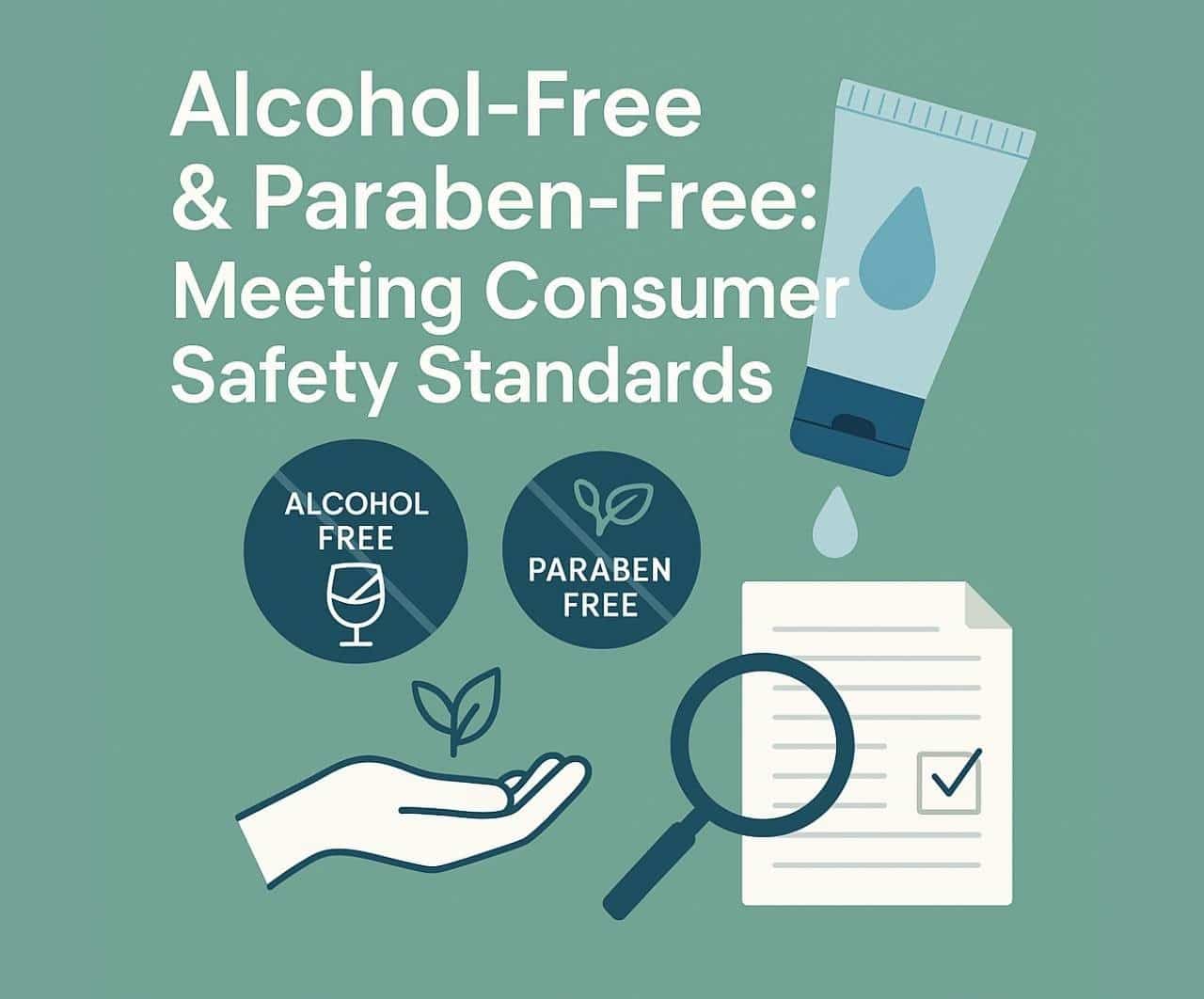In 2025, consumer priorities have shifted toward cleaner, safer, and more body-respectful products — especially in the world of intimacy. What was once considered a niche market for “sensitive skin” users has evolved into the mainstream standard. The rise of alcohol-free, paraben-free, and body-safe lubricants is now a defining trend in the adult product industry. Shoppers are no longer simply looking for function; they want ingredients that feel good and do no harm.
This heightened awareness around what goes on and in the body is transforming how water based lubes, sex lubes, and lubes for sex are formulated, packaged, and marketed. The clean-lube revolution is no longer optional — it’s expected. And as consumers become more educated, they’re using their buying power to demand higher standards from the brands they trust. Click to view more…
Trust Begins with the Label: Clean Ingredients Build Confidence
Consumers have become hyper-aware of ingredients, especially when it comes to products used on intimate, sensitive skin. Unlike previous generations who relied on brand reputation alone, today’s buyers are label-readers. They want to understand what’s in their products — and more importantly, what’s not.
In this new reality, alcohol-free and paraben-free formulations stand out not just for what they offer, but for what they omit. These terms are now shorthand for “safe,” “gentle,” and “thoughtfully made.” Shoppers equate clean labels with honest brands. And that perception directly affects purchasing decisions.
The shift toward alcohol-free lubricants stems from growing concern about irritation and drying, especially in vaginal or anal use. Meanwhile, avoiding parabens is increasingly common due to the ongoing debate about their potential impact on hormone function. Even if the science isn’t fully settled, many consumers are choosing to err on the side of caution — especially when safer alternatives exist.
Beyond Buzzwords: Why Free-From Formulas Really Matter
For many people, using sex lubes that are free from alcohol, parabens, and glycerin isn’t just a preference — it’s a necessity. Alcohol can cause burning, discomfort, and microtears, especially in anal sex. Parabens, as synthetic preservatives, have been scrutinized for their potential estrogenic activity. And glycerin, while naturally derived, has been linked to yeast infections due to its sugar-like molecular structure.
For people with vaginas, those with allergies, or anyone concerned about pH balance, these ingredients pose unnecessary risks. As a result, clean-label lubes for sex are no longer a niche product line; they are becoming the gold standard.
Many customers have experienced adverse reactions in the past and now search specifically for water based lubes without these irritants. These buyers aren’t looking for luxury — they’re looking for safety. And when they find brands that deliver, they stick with them.
Water Based Lubes: The Clean, Gentle Foundation of Intimate Care
Among all lubricant categories, water based lubes have emerged as the most trusted option for clean intimacy. Their natural compatibility with the body and broad versatility make them ideal for everything from solo play to partnered sex and toy use. They’re particularly well-suited for consumers who want something lightweight, easy to clean, and safe for all kinds of materials — including silicone toys.
What sets high-quality water based lubes apart in the clean-living era is their commitment to omitting harsh additives. When free from alcohol, parabens, glycerin, and artificial fragrances, these products provide not just moisture and glide but also peace of mind.
For many first-time lube buyers, water-based is the entry point. But even experienced users return to it for its gentleness and adaptability. Whether you’re using it for penetrative sex, anal play, or even on non-intimate areas like dry skin or chafing zones, alcohol-free and paraben-free water-based formulations feel clean, light, and safe.
From Search to Checkout: Clean Lubes Are Outperforming the Competition
Market data reveals a consistent surge in interest for products labeled as “clean,” “natural,” or “free-from.” Searches for phrases like “paraben-free sex lubes,” “natural lube for sensitive skin,” and “alcohol-free water based lubes” have grown year over year. This trend reflects a clear consumer behavior shift: people are seeking safety first, and they’re doing their homework.
Retailers and e-commerce brands have taken note. Top-performing product listings now include keywords like pH-balanced, body-safe, and alcohol-free right in their titles. Brands that clearly label their ingredients, offer third-party testing, or secure certifications for organic or vegan status are seeing better engagement and repeat customers.
Buyers aren’t just searching for what they want in a lube — they’re actively avoiding what they don’t want. For many, the absence of harsh chemicals has become the most important feature on the box.
Packaging, Language, and Transparency: Selling Safety in a Crowded Market
When it comes to lubricants, words matter. Clear and visible labels like “Alcohol-Free” or “Paraben-Free” can mean the difference between a sale and a pass. In-store shoppers are scanning quickly. Online buyers are reading fast. Packaging that communicates cleanliness, health, and sensitivity earns trust immediately.
The most successful clean-lube brands don’t just list ingredients — they explain them. Product pages that outline what each ingredient does, and what’s left out, offer consumers a chance to make empowered choices.
Design also plays a role. Minimalist, wellness-style packaging appeals to modern buyers who value aesthetics and function. Consumers increasingly associate clean design with clean formulation, making visual branding an essential part of the trust equation.
Safe for Every Body: Clean Lubes for All Types of Play
Different forms of intimacy require different types of support — but one thing they all need is safety. For vaginal use, the priority is often pH balance and avoiding infection risks. That’s why paraben-free, glycerin-free, and fragrance-free formulas are in high demand.
Many users with vaginas report that switching to a clean water based lube immediately reduced discomfort, irritation, or recurrent infections. It’s a change that feels not just different, but transformative.
Anal play, on the other hand, has its own specific requirements. Because the anus doesn’t self-lubricate, the best lubes for sex in this category must be long-lasting, thick, and incredibly gentle. Here again, alcohol-free formulations shine. They provide the glide necessary for comfort without the drying or burning effects that alcohol can cause.
Retailers are responding by bundling clean anal lubes with toys or hygiene kits under names like “Body-Safe from Start to Finish.” These curated bundles give consumers confidence that every part of their experience has been considered with safety in mind.
Clean Meets Botanical: The Rise of Natural, Plant-Based Ingredients
In addition to removing harmful ingredients, many leading sex lubes are incorporating naturally derived ones — a perfect marriage of safety and self-care. Today’s buyers are drawn to ingredients they recognize and trust: aloe vera for soothing, chamomile for calming, green tea extract for its antioxidant benefits, and seaweed-based gels for rich hydration.
These additions elevate the experience from functional to pleasurable. They smell natural, feel luxurious, and enhance the user’s sense of wellness. They also reinforce the product’s identity as something safe and nourishing — not just slippery.
Botanical ingredients also speak to values like sustainability and eco-consciousness, which are increasingly important to today’s consumers. Brands that go the extra mile to ensure their formulations are both body-safe and planet-friendly are building deep, lasting loyalty.
Brand Spotlights: Who’s Winning in the Clean Lube Space?
Several brands have emerged as leaders in the alcohol-free and paraben-free movement. Their success lies not just in their ingredient lists but in their storytelling, consistency, and commitment to customer health.
Aloe Glide by Good Clean Love is celebrated for its organic formula and performance with sensitive users. Sliquid H2O continues to win fans for being vegan, glycerin-free, and long-trusted in the sexual wellness space. Uberlube now offers a water based lube that delivers silky smooth texture without unnecessary fillers. YES WB stands out for medical-grade purity and organic certification, while Maude Shine blends clean performance with elegant, gender-neutral branding that appeals to wellness-focused millennials.
These brands show that safety and sophistication aren’t mutually exclusive — they’re the new gold standard.
How Retailers Can Lead the Clean Lube Movement
Retailers have a major role to play in the clean-lube revolution. First, segmenting product categories by ingredient — not just by use — helps shoppers find what they need faster. Filters like “Alcohol-Free,” “Vegan,” and “pH-Balanced” signal that your store understands consumer concerns and is ready to guide them.
Secondly, education is key. Include blog content, downloadable guides, or in-store signage that explains why alcohol-free and paraben-free formulations matter. The more knowledge a customer has, the more confident they feel — and the more likely they are to buy.
Finally, tap into social influence. Many sex educators and wellness influencers now focus heavily on clean-living sexual wellness. Partnering with them to review your products or host live Q&As can build credibility and reach.
FAQs: What Today’s Consumers Want to Know
Why is paraben-free so important in sex lubes?
Parabens are synthetic preservatives that may interfere with hormone levels. Many consumers prefer to avoid them, especially in intimate areas where skin absorption is high.
Are all water based lubes alcohol-free?
No. Some mass-market water based lubes still contain alcohol, especially those claiming to dry quickly. Always check the ingredient list — clean brands will clearly state alcohol-free on the label.
Do clean lubes cost more?
Sometimes. But for most users, the tradeoff is worth it. Clean lubes for sex typically use safer ingredients, which can be more expensive — but you often use less per application, and you avoid the risks of irritation or discomfort.
What makes sex lubes different from moisturizers?
Sex lubes are formulated for internal use, with pH and safety in mind. Moisturizers, even natural ones, may contain fragrances or oils that irritate or disrupt vaginal flora. Always use products intended for intimate use.
The Future Is Clean: What’s Next in Lube Innovation?
The clean movement is just getting started. Innovations on the horizon include pH-personalized lubricants, prebiotic formulations to support vaginal flora, and eco-friendly packaging like refillable pouches or glass bottles. Brands are also exploring ultra-luxe, fragrance-free options that marry clinical performance with high-end design.
Forward-thinking retailers are already developing online quizzes to match customers with their perfect water based lube based on preferences, play style, and body chemistry. This personalization trend is expected to fuel the next wave of growth in the clean intimacy sector.
Conclusion: Clean Lubes Define the Future of Pleasure
The rise of alcohol-free, paraben-free, and body-safe lubricants isn’t a marketing gimmick — it’s a cultural shift. Shoppers now associate clean intimacy with respect, empowerment, and health. Whether through safer sex lubes, versatile water based lubes, or specialized lubes for sex, consumers are demanding better — and brands are rising to meet them.
For anyone in the adult product space, the message is clear: prioritize clean formulations, support with education, and lead with transparency. Those who do will earn more than just customers — they’ll earn loyalty. Click to view more…

